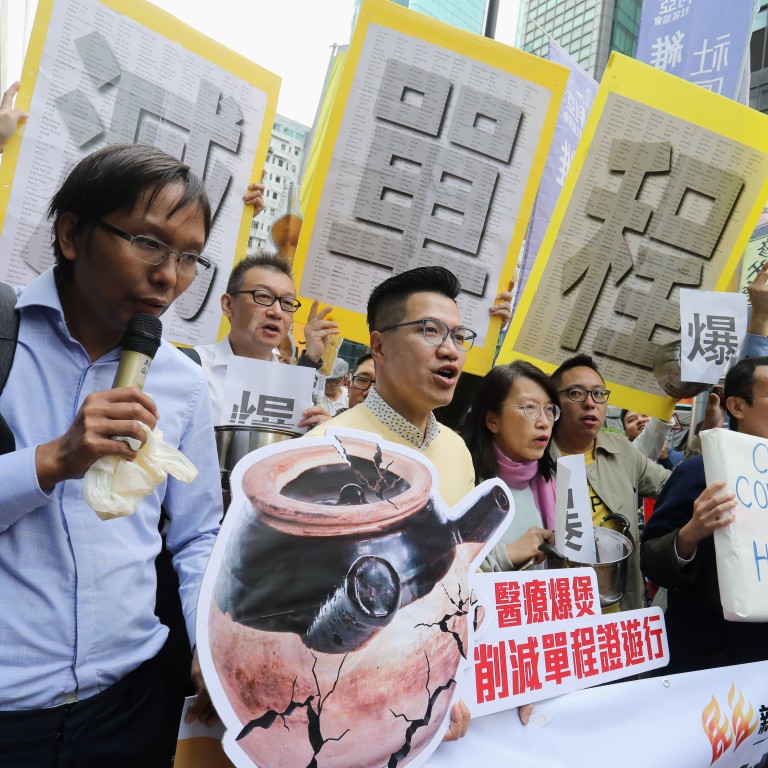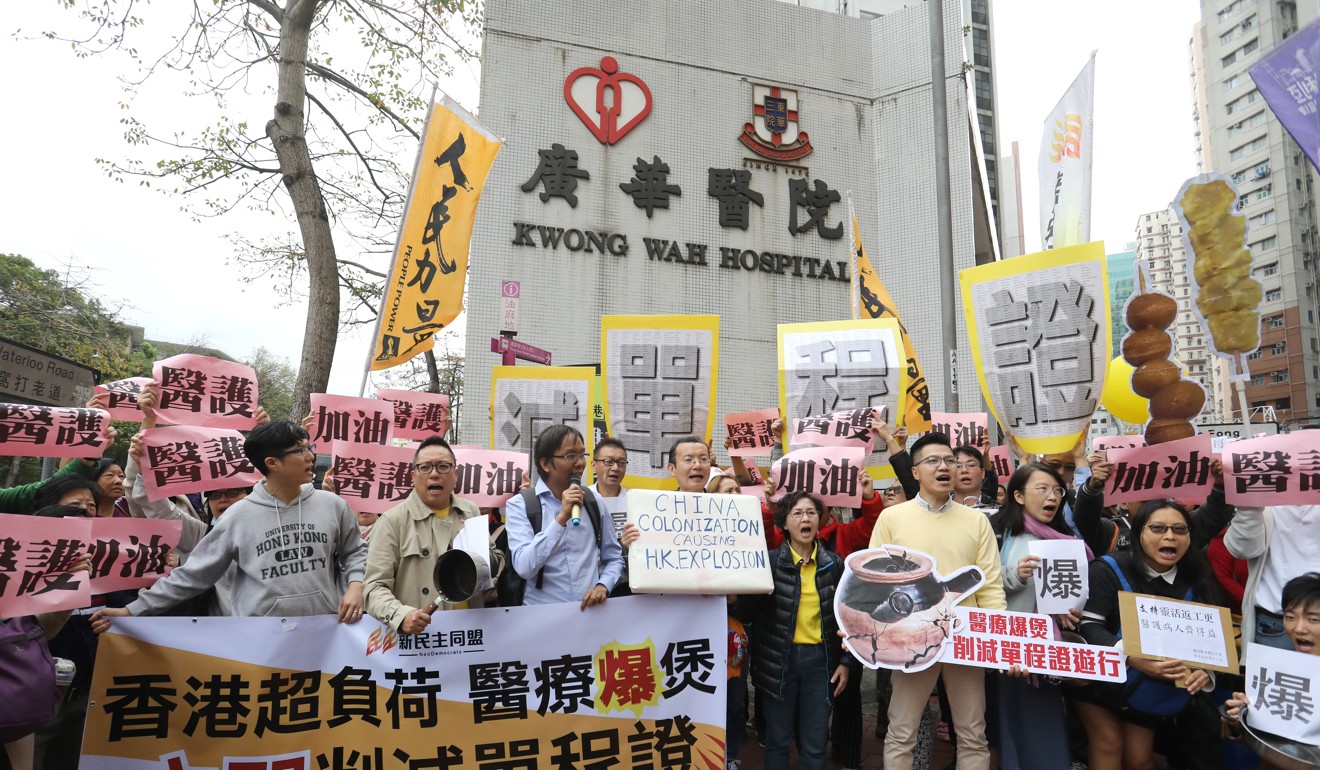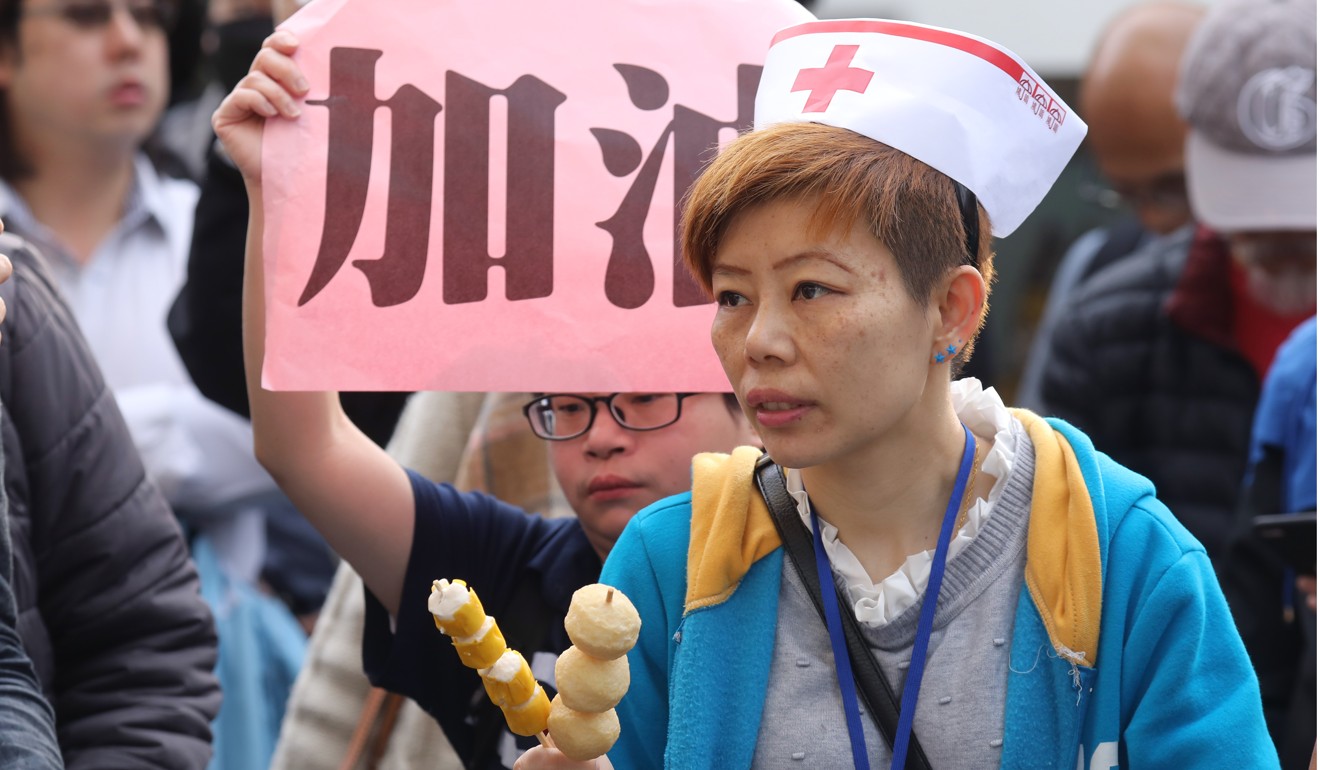
Hundreds of Hong Kong protesters march to Kwong Wah Hospital, claiming city’s health care system overwhelmed by mainland Chinese migrants
- Activists call for end to so-called one-way permit scheme, which allows 150 mainlanders a day to relocate to the city
Hundreds of localist activists and their supporters marched to a Hong Kong public hospital on Sunday to show support for medical staff they said were overburdened by a flood of migrants from mainland China.
Members of more than 10 political parties, interest groups and nurses’ representatives claimed a scheme allowing 150 mainlanders a day to relocate to the city was a source of overcrowding at public hospitals as well as medical blunders.
The protest was the second in the past week against the so-called one-way permit scheme. Organisers claimed 1,000 took part, while police put the number at 380.
Waving banners and placards with messages including “Hong Kong is sinking” and “China colonisation causing Hong Kong explosion”, the demonstrators chanted slogans calling for the scheme to be scrapped as they marched through the streets of Mong Kok, a downtown shopping district in Kowloon popular with mainland visitors.

Some protesters carried pots bearing labels with the word “explosion”, in reference to a local slang term that describes pressure reaching a point at which a blast occurs.
The demonstrators gathered outside Kwong Wah Hospital in Yau Ma Tei, where many told bystanders that they wanted to let doctors and nurses know Hong Kong people appreciated their hard work.
Protest spokesman Roy Tam Hoi-pong, of the NeoDemocrats, said: “We don’t need to be maths geniuses to know Hong Kong cannot cope with an unlimited inflow of 150 people a day, which is more than 50,000 a year.”
NeoDemocrats lawmaker Gary Fan Kwok-wai added: “The system is overwhelmed. Medical staff are overloaded and the result has been not only a manpower shortage but also a higher risk of medical blunders.”
According to the Hospital Authority, which manages the city’s public hospitals, medical wards at 15 facilities were more than full on Saturday, with the occupancy rate standing at 105 per cent. United Christian Hospital in Kwun Tong was the most overcrowded. Kwong Wah had a ward occupancy rate of 110 per cent.

Debate on the contribution of migrants to the problem has become heated in recent months after some local doctors claimed a large portion of the patients they treated were newcomers to the city.
But welfare charity the Society for Community Organisation said migrants were a major source of labour and had contributed to Hong Kong’s economic success. The group accused the activists of playing the politics of hatred. It argued hospital overcrowding was mainly due to the ageing population and cited official figures that showed the median age of new migrants was 33.9 years old, well below the city’s overall figure at 44.3.
Last year labour minister Dr Law Chi-kwong said the one-way permit scheme had added roughly 700,000 people to the workforce over the past two decades.
Among Sunday’s protesting crowd was Dr Kwong Po-yin, an emergency room doctor, who said: “Because of different cultural and social backgrounds, many new migrant patients like to ask for specialised treatment and specialist examinations. But that is not the standard practice in Hong Kong, so this could give rise to conflict.”
The former member of Hong Kong independence political group Youngspiration added: “More people coming in will undoubtedly drain Hong Kong’s medical resources.”
A part-time nurse named Natalie Tsui said the protest was not about discrimination but the quality of medical services.
“We take care of migrants just as we do locals, but we hope our patients can receive proper care in a decent environment. We are only asking that the government cut down on the number of mainlanders allowed to move to Hong Kong.”
Overcrowding had led to the setting up of temporary beds in corridors, she added, sometimes even outside bathrooms.
Tam Tak-chi, an activist with localist party People Power, said: “One major problem is that the Hong Kong government has no say on who should be allowed to come here under the one-way permit scheme. The Chinese government can decide on its own. It’s not a migrant scheme, it’s a colonisation programme.”

